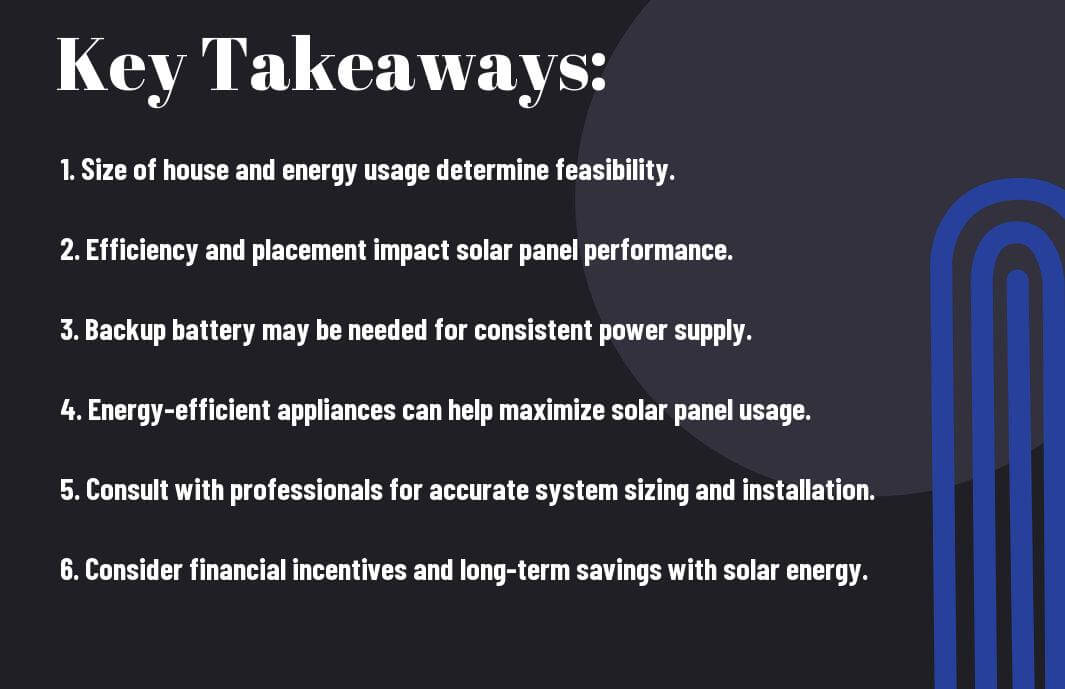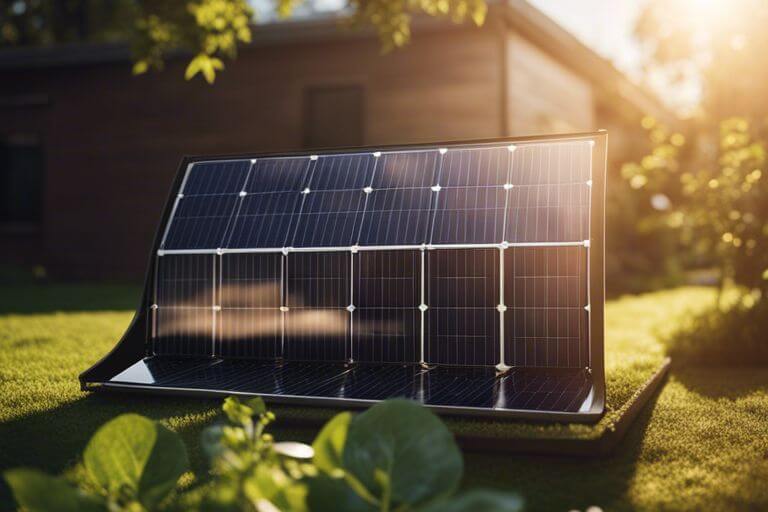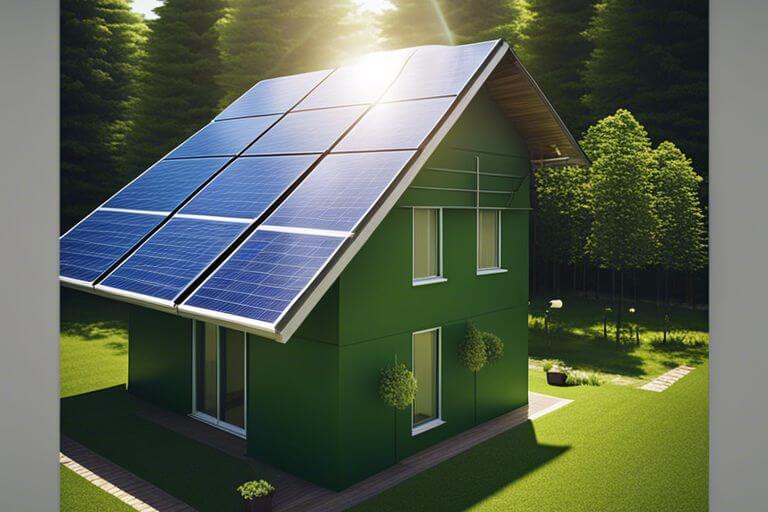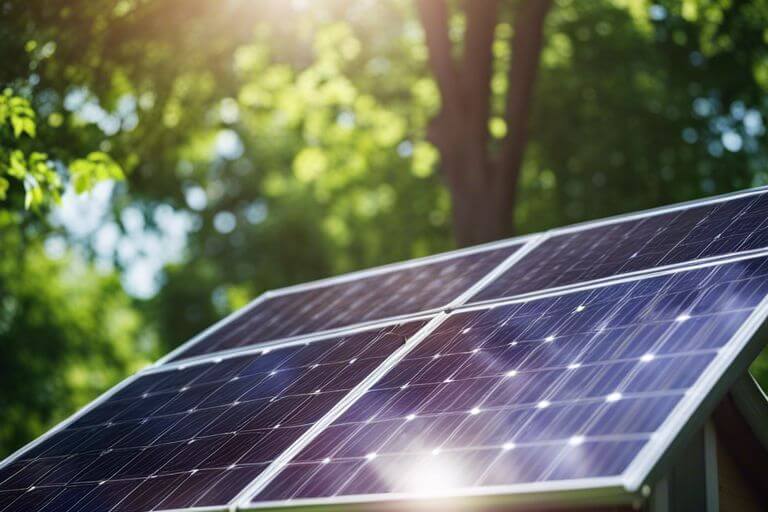Many homeowners wonder, can one solar panel really power an entire house? In this blog post, we will explore this question and provide you with the information you need to make an informed decision. If you want to explore deeper into the topic, you can also check out this insightful discussion on Can solar panels power an entire house? If so, what would be required. By the end of this post, you will have a better understanding of the feasibility and requirements of using a single solar panel to power your entire home.
Key Takeaways:
- Size and Efficiency: The size and efficiency of the solar panel system are crucial in determining whether it can power a whole house.
- Energy Consumption: The energy consumption of the house must be accurately calculated to determine if one solar panel can meet the demand.
- Battery Storage: Incorporating battery storage with the solar panel system can help provide power during non-sunny hours and increase the likelihood of powering the whole house.

The Concept of Solar Power
While you may have heard about solar power and its benefits, understanding how it works is crucial to grasp its full potential.
How Solar Panels Work
Powering your house with solar energy starts with solar panels, which are made up of photovoltaic (PV) cells. These cells absorb sunlight and convert it into direct current (DC) electricity. An inverter then converts the DC electricity into alternating current (AC) electricity, which is the type of electricity used to power your home. This AC electricity is then used to power your appliances and lighting, making your house self-sufficient in terms of energy consumption.
The Benefits of Solar Energy
On top of reducing your carbon footprint and reliance on traditional power sources, solar energy offers financial benefits as well. By generating your own electricity, you can significantly reduce or even eliminate your monthly electricity bills. Additionally, some areas offer incentives such as tax credits for installing solar panels, making it an even more attractive option for powering your home.
Energy independence is another significant advantage of solar power. By generating your electricity, you are less vulnerable to fluctuations in energy prices and potential power outages. This reliability can give you peace of mind knowing that your house will have power even in adverse conditions.

The Energy Requirements of a House
Average Energy Consumption of a Household
Household energy consumption can vary depending on the size of the house, the number of occupants, and their energy usage habits. On average, a typical American household consumes about 877 kWh per month. This translates to an average daily consumption of around 29 kWh.
Peak Energy Demand Hours
Households usually experience peak energy demand during the early morning hours when everyone is getting ready for the day, and in the evening when occupants return home and start using appliances and electronics simultaneously. These peak hours can put a strain on the grid and result in higher energy costs for consumers.
With the increasing adoption of electric vehicles and smart home technologies, peak energy demand hours are becoming more pronounced as households try to balance their energy needs efficiently. It is crucial for homeowners to consider their peak energy usage when evaluating their solar panel requirements.
The Capabilities of a Single Solar Panel
Many people wonder if just one solar panel can generate enough power to meet all their energy needs. Let’s explore the capabilities of a single solar panel in this chapter.
Typical Output of a Residential Solar Panel
To understand the potential of a single solar panel, you need to consider its typical output. On average, a residential solar panel can generate anywhere from 250 to 400 watts of power. This amount of energy can vary based on factors like sunlight exposure, panel orientation, and weather conditions.
Factors Affecting Solar Panel Efficiency
To maximize the efficiency of your solar panel, you should be aware of the factors that can impact its performance. Here are some key elements to consider:
- The angle and orientation of the panel
- The amount of sunlight the panel receives
- The presence of any shading on the panel
After installing a solar panel, it’s imperative to keep these factors in mind to ensure optimal energy production.
Panel Placement and Maintenance
To get the most out of your solar panel, proper placement and maintenance are crucial. Make sure to install the panel in a location that receives ample sunlight throughout the day. Additionally, regularly clean the panel to remove any dust or debris that could reduce its efficiency.
After following these tips, you can harness the full potential of a single solar panel to power your household appliances and reduce your carbon footprint.
Can One Solar Panel Power a Whole House?
Unlike traditional sources of energy, solar power offers a clean and renewable alternative that can potentially power your entire house. However, the question remains – can one solar panel really generate enough electricity to meet all your household needs?
Theoretical Calculations
On a theoretical level, one solar panel has the potential to generate around 250 to 400 watts of electricity under optimal conditions. With an average household consuming about 10,649 kilowatt-hours (kWh) per year, you would need approximately 26 to 42 solar panels to cover your annual electricity consumption. So, while one solar panel can certainly contribute to powering your house, it may not be sufficient on its own.
Real-World Examples and Limitations
Solar panels are not always able to operate at maximum capacity due to factors such as weather conditions, shading, and panel orientation. Additionally, your energy consumption patterns may not align with the sun’s peak hours of production. To fully power a whole house with solar energy, you would likely need a larger system with multiple panels and a storage solution like batteries to ensure a constant power supply.
Solar power systems require careful planning and customization to meet your specific energy needs. While one solar panel can make a significant difference in reducing your electricity bill and carbon footprint, powering an entire house may require a larger investment in a comprehensive solar setup.

Overcoming Energy Shortfalls
Energy Storage Solutions (Batteries)
After installing a solar panel system, you may encounter energy shortfalls, especially during periods of low sunlight or at night. Energy storage solutions, such as batteries, can help you store excess energy generated during the day for use when sunlight is scarce. By storing energy in batteries, you can ensure a more stable and reliable power supply for your home, reducing your reliance on the grid.
Grid Connection and Net Metering
Storage
Energy grid connection and net metering are other ways to overcome energy shortfalls when relying on solar power. When your solar panels produce excess energy, you can feed it back into the grid through a process called net metering. This allows you to earn credits for the surplus energy you generate, which can be used to offset any energy drawn from the grid when your solar panels are not producing enough power.
For instance, if you produce more energy than you use during the day, you can draw from the grid at night without incurring additional costs. Net metering enables you to maximize the benefits of your solar panel system and ensures a more consistent power supply for your household.
The Future of Solar Power
Advancements in Solar Panel Technology
Not only are solar panels becoming more efficient at capturing sunlight and converting it into electricity, but they are also becoming more affordable. Advances in technology have led to improvements in the efficiency of solar cells, allowing them to generate more power from the same amount of sunlight. This means that in the future, you can expect solar panels to become even more cost-effective and powerful, making it easier for you to power your entire house with solar energy.
Increased Adoption and Economies of Scale
One of the most significant factors driving the future of solar power is the increased adoption of solar panels around the world. As more and more people choose to install solar panels on their homes, the demand for them increases. This, in turn, leads to economies of scale, which can help drive down the cost of solar panels even further. As the cost of solar panels continues to decrease, it becomes more accessible for you to power your whole house with clean, renewable energy.
Panel manufacturers are also investing in research and development to improve the efficiency and durability of solar panels. This means that in the future, you can expect solar panels to be even more reliable and long-lasting, providing you with a sustainable source of energy for years to come.
To maximize the benefits of solar power for your home, it’s important to stay informed about the latest advancements in solar panel technology and the increasing adoption of solar energy. By taking advantage of these developments, you can reduce your carbon footprint, save money on your electricity bills, and contribute to a more sustainable future for our planet.
Final Words
Summing up, while a single solar panel may not be enough to power an entire house, adding multiple panels to your home can significantly reduce your reliance on traditional energy sources. By harnessing the power of the sun, you not only save money on your electricity bills but also contribute to a more sustainable environment. So, consider investing in a solar panel system for your home and take the first step towards a brighter and greener future.
FAQ
Q: Can one solar panel power a whole house?
A: It is unlikely that one solar panel can power an entire house. The average household in the United States uses about 877 kWh of electricity per month, which would require multiple solar panels to generate enough power.
Q: How many solar panels are needed to power a whole house?
A: The number of solar panels needed to power a whole house depends on factors such as the size of the house, the energy consumption of the household, and the efficiency of the solar panels. On average, a typical home may need anywhere from 20 to 30 solar panels to fully power the house.
Q: Can solar panels reduce electricity bills for a whole house?
A: Yes, installing solar panels can significantly reduce electricity bills for a whole house. Solar panels generate electricity from sunlight, which can offset the electricity purchased from the grid. In some cases, homeowners may even generate excess electricity that can be sold back to the grid, further reducing electricity expenses.
